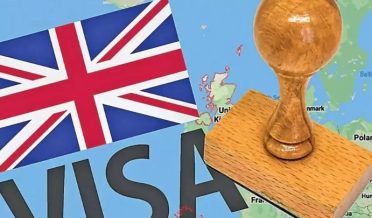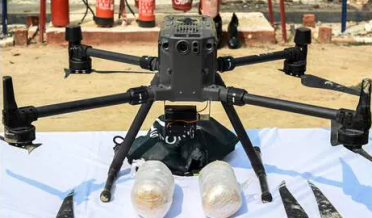
Hamid Mir
Pakistani and Indian media have reported many times in the recent past that drug smugglers have been using drones in border areas, but no high-level Pakistani official has publicly admitted that fact before.
We know that many politicians lie on TV screens and voters often let them get away with it. Sometimes, politicians cannot lie if you ask a question in the presence of their voters. That is what happened to a close aide of Pakistan Prime Minister Shehbaz Sharif a few days ago when he admitted in front of me that smugglers are using drones for transporting drugs between Pakistan and India. This admission by the Prime Minister’s special assistant on Defence, Malik Muhammad Ahmad Khan, made headlines not only in Pakistan but also in India.
Malik Muhammad Ahmad Khan never disclosed a big secret. Pakistani and Indian media have reported many times in the recent past that drug smugglers have been using drones in border areas, but no high-level Pakistani official has publicly admitted that fact before. I think that Malik sahib had no other option than to admit an open secret which is becoming a big problem on both sides of the border. I know that some powerful people were disturbed by his statement, but his voters were very happy.
Now, we need to understand why Malik Muhammad Ahmad Khan made such a risky statement which provided an opportunity to many people in India to blame Pakistan for sending drugs across the border through drones. Malik sahib made this statement at a village very close to the Pakistan-India border in Kasur district. This area was badly affected by recent floods caused by the river Sutlej. Many villages close to the banks of Sutlej were drowned in flood water. More than 14,000 people were evacuated from this area by boats. I also reached this flood-affected border area on a boat.
I met Malik Muhammad Ahmad Khan near a flood-affected village, Chanda Singh Wala. We both visited many flood-affected villages near the International Border in a boat. Locals were pleasantly surprised to see their elected representative moving in flood waters with me. Many farmers were telling Malik sahib about the destruction of their corn and rice crops worth millions of rupees. One schoolteacher complained to him about the suspension of mobile phone networks in the area. It was unbelievable for me that mobile phone services were suspended in a flood-affected area. A police official told me that he was facing problems in coordinating with the local administration for the evacuation of the villagers. I asked him why mobile phone services were suspended.
The police officials blamed the smugglers for using drones on both sides of the border. He told me that a few days ago, a drone came from the Indian side and crashed into a big tree near the village Sehjra. According to the local police, the drone was carrying some drugs (medicines that are illegal in Pakistan) prepared by Indian pharmaceutical companies. The police officer never remembered the names of the drugs, but he told me that usually Indian smugglers send chemicals and drugs which can be used in the making of heroin and Pakistani smugglers send heroin through drones. When police reported that incident to rangers, they suspended mobile phone services in the area to stop the movement of drones.
Many other villagers also reported the same incident to me in the presence of Malik Muhammad Ahmad Khan and asked, ‘If security forces deployed on the border cannot stop the movement of smugglers who use drones, it’s not the fault of the public. Why did security forces suspend mobile phone services for the public in a flood-affected area?’ They asked me that a few days ago, a drone carrying heroin crashed near Kahna, very close to Lahore, but why mobile phone services in that area were not suspended.
It was a very genuine question which was raised again and again in front of me by locals. When I asked this question to Malik sahib about the use of drones by smugglers in that border area, he had to admit the fact, but he tried to defend the security forces.
He said that rangers often shoot down drones and sometimes, they need to suspend mobile phone services because smugglers use the network for coordinating with each other, especially WhatsApp calls. He also warned the government that smuggling was already a problem in his constituency and floods could further complicate the problem. He clearly said that flood-affected farmers need some relief packages to continue farming. Otherwise, poverty may force most of them to become facilitators of smugglers.
I visited the border area of Kasur to highlight the problems of local farmers caused by floods. Drug smuggling was not my focus, but this is also affecting not only Pakistan and India but the whole region like a flood. This flood of drugs is coming from Afghanistan and spreading in different parts of the world, including European countries.
According to the United Nations Office of Drug & Crime (UNODC), Afghanistan is the biggest producer of opium in the world and the annual trafficking of heroin from Afghanistan to the rest of world is approximately 375 tons.
In Afghanistan, opium is as big a winner as extremism. I have warned many times in the recent past that either Afghanistan destroys opium or opium will destroy Afghanistan and its neighbours. After the fall of Kabul in 2021, I wrote in the Washington Post that a flood of drugs from Afghanistan may become a bigger threat than terrorism.
Drug labs in Afghanistan are not only producing heroin and hashish but have also started making methamphetamine (known as ‘meth’ or ‘ice’) from the Ephedra plant, which is found in the wild across the country. Meth is easily available to college and university students in Pakistan, especially Peshawar and Islamabad, which are close to the Afghan border. This dangerous drug is also known as ice and is cheaper than heroin. Pakistan has failed to stop the flow of this poisonous drug from Afghanistan, which is destroying its future generation in educational institutions.
Heroin and meth are easily available not only in Pakistan but also in India, especially in the Indian Punjab. It is called “chitta” in border areas. Police in Pakistani Punjab arrested many people for cross-border drug smuggling through drones but police in Indian Punjab look more serious to dismantle the network involved in smuggling through drones. The Indian Punjab police announced a cash reward of Rs 1 lakh for those who spot drones for drug smuggling in their areas. According to a BBC report, “Punjab’s proximity to Afghanistan and Pakistan, with which it shares a border, has meant that it’s a major transit route in the lucrative drug smuggling trade. That’s one reason why heroin is so readily available.”
On my way back from Kasur to Lahore, I stopped at another place close to Ganda Singh Wala village for tea. This village is very close to the border. Locals told me interesting stories about the tactics of smugglers. They revealed that if drones are not working due to the suspension of mobile phone networks, then smugglers use very old traditional methods of transporting drugs from one place to another.
Sometimes, they pack heroin in plastic bottles and throw the bottles in the river and their counterparts pick them up across the border. I was confused when I heard about the smuggling of heroin through rivers because the river is coming from India. Locals cleared my confusion by explaining the geography of the area.
The border near Ganda Singh Wala is very complicated. First, the river Sutlej enters Pakistan from India and then again, enters Indian territory, from where it again comes back to Pakistani territory. This zigzag border complication helps Pakistani smugglers transport heroin to the other side through bottles.
Sometimes, Indian security forces intercept the bottles but sometimes, they fail to spot them. Locals said that smugglers on both sides work in coordination with some corrupt elements of security forces. A villager suggested I watch a Netflix drama series about drug cartels on both sides – CAT. This Punjabi language series is very popular in the border areas of Pakistani Punjab. A local politician declared that CAT is just another Indian conspiracy against Pakistan. Someone reminded him that CAT exposed an Indian woman politician who was also involved in drug smuggling.
I asked them what kind of drugs were coming from India to Pakistan. Most of the people mentioned liquors but a doctor gave me the details of some chemicals and drugs coming from India. He explained to me the process of making heroin from opium and the requirement of some chemicals which are not easily available in big quantities.
He referred me to a report by the UNODC about the smuggling of chemicals and some illicit drugs, including ketamine, from India to many countries. I asked him who buys these chemicals and illicit drugs. The doctor laughed and said, ‘Our Afghan brother’s buy these chemicals because they are running heroin making labs under the protection of Taliban and they sell illicit drugs manufactured by Indian pharmaceutical companies to Pakistani buyers.’ Nobody can deny the fact that the Afghan Taliban failed to stop the export of terrorism and heroin into Pakistan. This heroin is going to India from Pakistan and to Europe via central Asia and Iran.
To cut the story short, India and Pakistan are one of the biggest victims of drug flood from Afghanistan. The governments of India and Pakistan are reluctant to discuss this big issue with each other, but the smugglers from both sides are cooperating with each other through drones and dark net.
Dark net markets are difficult to trace. Most of the dark net is being used for drug trafficking. Indian and Pakistani smugglers make transactions in cryptocurrency. The bosses of the underworld from India and Pakistan make plans in some gulf countries. Some people in Delhi and Islamabad may not agree, but after visiting the border areas of Kasur, I was forced to say that drug smuggling through drones is becoming a big challenge to the national security of India and Pakistan. It is now a global threat because drugs smuggled via drones are reaching other countries via India. Malik Muhammad Ahmad Khan only identified this challenge, but meeting this challenge requires some urgent steps from the powerful people in India and Pakistan.







